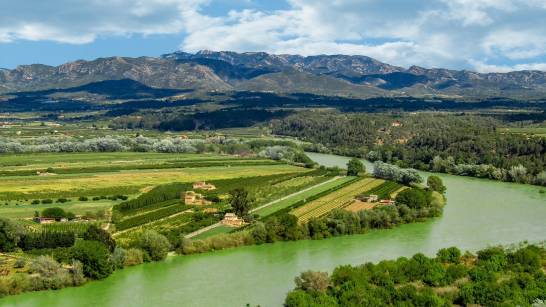A study carried out by the Institute of Water and Environmental Engineering and the Polytechnic University of Valencia (IIAMA-UPV) reveals a methodology to assess the risks derived from climate change in river ecosystems, identifying the most vulnerable areas and the impact on species of cold water, macroinvertebrates and the reduction of dissolved oxygen in water.
This is the main result of the research carried out by researchers from the Water Resources Engineering Group, Clara Estrela Segrelles, Miguel Ángel Pérez Martín and Gabriel Gómez Martínez, who present at the scientific article published in the Water Resources Management magazine.
The work is based on the fact that the unequivocal warming of the climate system will significantly affect the river ecosystems of the Mediterranean region and will affect all of Spain. In fact, different scenarios predict that the water temperature of Mediterranean rivers will increase between 2.2ºC and 2.9ºC by the end of the century.
Different scenarios predict that the temperature of Mediterranean rivers will increase between 2.2°C and 2.9°C by the end of the century
To analyze this context, experts developed a risk assessment methodology that provides a series of indicators on the threat, exposure and vulnerability to the impacts of climate change.
adaptation measures
“Risk maps are fundamental tools for prioritizing the areas in which mitigation measures should be implemented and, thus, improving the adaptability of river ecosystems to the reduction of their resources”, says researcher Miguel Ángel Pérez Martín .
As part of the work, the effect of global warming of the atmosphere on the ecological status of water bodies at national level was studied, applying the methodology to the 5,017 bodies of surface water that make up the Spanish hydrographic network.
Research focuses on the effects of climate change on the ecological status of water bodies nationwide
“The results show that rising temperatures will cause cold water species such as brown trout, as well as macroinvertebrates, to significantly reduce their potential habitat. It can also affect oxygen levels in surface waters”, says Clara Estrela, researcher at IIAMA during her PhD.
Therefore, it is considered essential to articulate a set of preventive measures that “improve the riverside vegetation in order to generate shading zones for the ecosystems, the creation of thermal shelters along the water bodies and the protection of groundwater”, indicates Miguel Ángel Pérez Martín, in the study’s release note.
Maps of the impacts of climate change and proposed action. /IIAMA/UPV
Short and long term impacts
In the short term, between 27% and 35% of water bodies (depending on the climate change scenario taken as a reference) present a high or very high risk of loss or significant reduction of habitat for cold water species, with the intermediate sections of the most affected rivers. In the longer term, the impact of global change could increase the affected area by between 55% and 80% and would affect a splitting of ecosystems.
Regarding the effect on macroinvertebrates, in the short term, global warming could make between 4% and 32% of water bodies at high risk, while in the long term this danger will increase between 83% and 92%.
The study considers it fundamental to act preventively in the protection of groundwater
“This means that there is a condition in all the stretches of the rivers, both in the headwaters and in the middle and lower sections”, explains Gómez Martínez.
For her part, the IIAMA researcher highlights the fact that research helps to improve knowledge about the risks of climate change and allows the competent bodies for its management, such as the Hydrographic Confederations, “to prioritize areas of action and implement measures that reduce vulnerability and can be incorporated into the different Hydrological Plans”.
Reference:
Estrela-Segrelles, C. et al. “Risks of Climate Change in Mediterranean River Ecosystems and Adaptation Measures” (Spain). Water Resources Management (2023).
